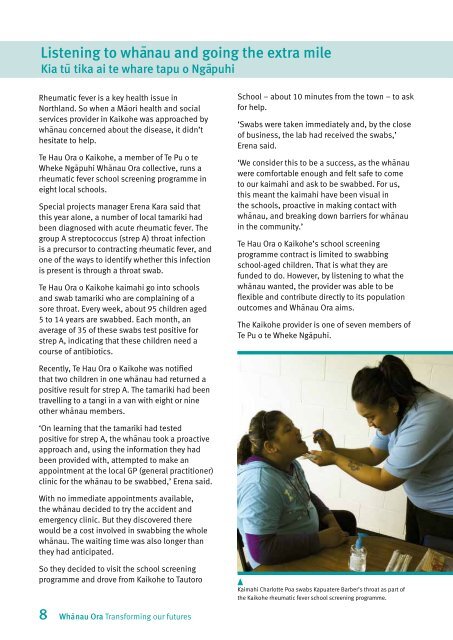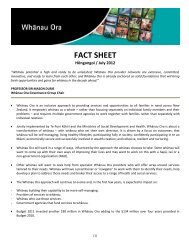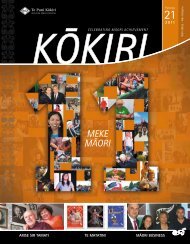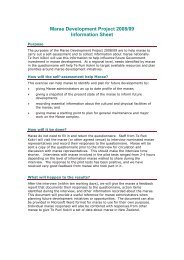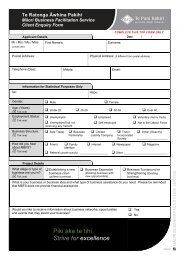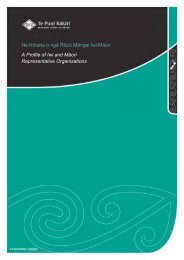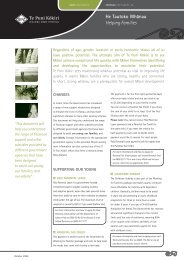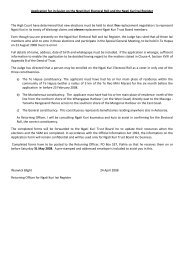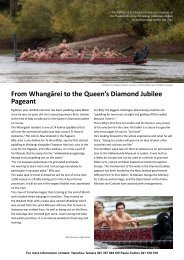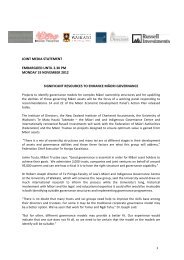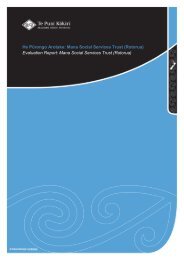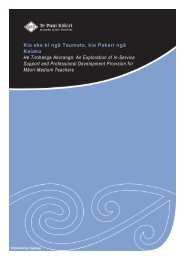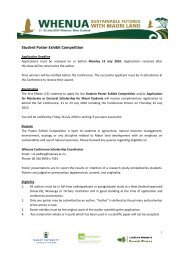Wnanau Ora - Transforming Futures - Te Puni Kokiri
Wnanau Ora - Transforming Futures - Te Puni Kokiri
Wnanau Ora - Transforming Futures - Te Puni Kokiri
- No tags were found...
Create successful ePaper yourself
Turn your PDF publications into a flip-book with our unique Google optimized e-Paper software.
Listening to whānau and going the extra mileKia tū tika ai te whare tapu o NgāpuhiRheumatic fever is a key health issue inNorthland. So when a Māori health and socialservices provider in Kaikohe was approached bywhānau concerned about the disease, it didn’thesitate to help.<strong>Te</strong> Hau <strong>Ora</strong> o Kaikohe, a member of <strong>Te</strong> Pu o teWheke Ngāpuhi Whānau <strong>Ora</strong> collective, runs arheumatic fever school screening programme ineight local schools.Special projects manager Erena Kara said thatthis year alone, a number of local tamariki hadbeen diagnosed with acute rheumatic fever. Thegroup A streptococcus (strep A) throat infectionis a precursor to contracting rheumatic fever, andone of the ways to identify whether this infectionis present is through a throat swab.<strong>Te</strong> Hau <strong>Ora</strong> o Kaikohe kaimahi go into schoolsand swab tamariki who are complaining of asore throat. Every week, about 95 children aged5 to 14 years are swabbed. Each month, anaverage of 35 of these swabs test positive forstrep A, indicating that these children need acourse of antibiotics.School – about 10 minutes from the town – to askfor help.‘Swabs were taken immediately and, by the closeof business, the lab had received the swabs,’Erena said.‘We consider this to be a success, as the whānauwere comfortable enough and felt safe to cometo our kaimahi and ask to be swabbed. For us,this meant the kaimahi have been visual inthe schools, proactive in making contact withwhānau, and breaking down barriers for whānauin the community.’<strong>Te</strong> Hau <strong>Ora</strong> o Kaikohe’s school screeningprogramme contract is limited to swabbingschool-aged children. That is what they arefunded to do. However, by listening to what thewhānau wanted, the provider was able to beflexible and contribute directly to its populationoutcomes and Whānau <strong>Ora</strong> aims.The Kaikohe provider is one of seven members of<strong>Te</strong> Pu o te Wheke Ngāpuhi.Recently, <strong>Te</strong> Hau <strong>Ora</strong> o Kaikohe was notifiedthat two children in one whānau had returned apositive result for strep A. The tamariki had beentravelling to a tangi in a van with eight or nineother whānau members.‘On learning that the tamariki had testedpositive for strep A, the whānau took a proactiveapproach and, using the information they hadbeen provided with, attempted to make anappointment at the local GP (general practitioner)clinic for the whānau to be swabbed,’ Erena said.With no immediate appointments available,the whānau decided to try the accident andemergency clinic. But they discovered therewould be a cost involved in swabbing the wholewhānau. The waiting time was also longer thanthey had anticipated.So they decided to visit the school screeningprogramme and drove from Kaikohe to TautoroKaimahi Charlotte Poa swabs Kapuatere Barber’s throat as part ofthe Kaikohe rheumatic fever school screening programme.8 Whānau <strong>Ora</strong> <strong>Transforming</strong> our futures


